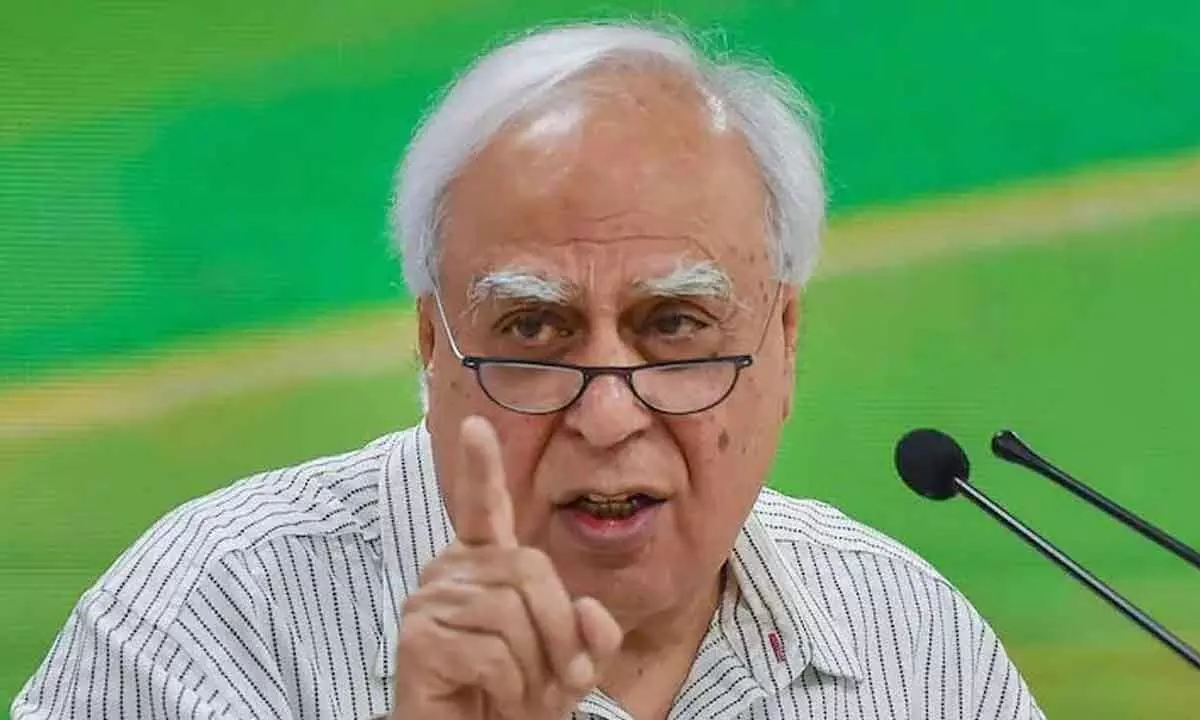Sibal underlines party managers' tyranny
One need not be a political commentator to know that venality and unscrupulousness have not decreased since the law was enacted
image for illustrative purpose

After quitting the Congress, senior leader Kapil Sibal said something very important: that political parties suppress the voice of their leaders.
He told a news channel: "I think that we are all constrained by the fact that we are members of political parties and that is why we have to abide by the discipline of those parties. I think it is important to be an independent voice. When an independent voice is raised, people will understand that it is not associated with any party."
That's a bit rich coming from the former telecom minister in the Manmohan Singh government, who had justified the draconian, anti-free speech Section 66A of the Information Technology Act. Thankfully, the Supreme Court invalidated the Section in 2015. But still, Sibal has a point.
He is privileged that his candidature for the Rajya Sabha has been supported by the Samajwadi Party, but not all politicians are so fortunate. They have to survive in an ecosystem governed by another draconian piece of legislation, the 52nd amendment to the Constitution (1985), commonly known as the anti-defection law.
Technically, in parliamentary democracy, the executive is responsible to the executive; in practice, however, it is the other way around. Parliamentarians and Members of Legislative Assembly have to obey the diktats of their respective party leaderships. Democracy stands on its head: while lawmakers are directly elected by the people and thus should be answerable to them (the people), in practice they become answerable to, indeed servants of, party managers.
The Amendment, intended to end "legislative anarchism" and corruption in politics, provided that a lawmaker would cease to be a member of the legislature: if he/she resigns from the party on whose ticket he/she was elected; if he votes, or abstains from voting, in the House "contrary to any direction" issued by the political party to which he belongs; or if he/she has been expelled from such political party "in accordance with the procedure established by the Constitution, rules or regulations" of such party.
The author of the law, the then law minister Asoke Sen, claimed that it would "cleanse the political life of this country of the dirt accumulated over the years."
One need not be a political commentator to know that venality and unscrupulousness have not decreased since the law was enacted. Worse, the medicine has proved to be infinitely worse than the disease, for it has resulted in another malady: enslavement of elected representatives.
The English language continues to betray the fact that in our democracy the elected representatives are regularly degraded. Such expressions as 'the chief minister is trying to keep his flock together so that the Opposition doesn't poach on them', 'MLAs have been herded to a resort,' and 'the party has issued whip to the MLAs' are regularly used in political parlance. Flock, herd, poaching, shepherding, poaching, whip—this is the lexicon of animal trainers, not of political commentators. Yet, top journalists and other opinion makers frequently use these words, blissfully unaware of the subconscious acceptance of the degradation of democracy.
It is interesting to notice that the Opposition at that time resisted the Bill. LK Advani of the Bharatiya Janata Party (BJP) was prophetic in his lamentation that this would "muffle dissent forever in a party like the Congress (I)…"
It is another matter that when his party was in office in 2003, and he was deputy prime minister, the BJP-led government decided to make the law even more stringent. The 1985 law recognised a "split" in a party if at least one-third members of the legislature party decided to form or join another political party. The BJP-led government, however, introduced the 91st amendment to the Constitution in 2003, making the requirement for split or merger stiffer: since then, at least two-third members of a legislature party need to leave the party. Evidently, Advani & Co forgot the muffle-dissent rhetoric.
Hypocrisy, however, is not the monopoly of the BJP. Speaking at the Kerala Literature Festival in Kozikhode, Kerala, on February 5, 2017, Congress MP and former Union minister Shashi Tharoor said the anti-defection law negatively impacted democracy as it diminished the voting power of people's representatives. "The anti-defection law has a negative impact on democracy. A people's representative does not have the right to vote according to his conscience. He has to vote on what his party says," PTI quoted him in its report.
The same old story: introduce illiberal laws when in power, and slam such legislation when in the Opposition. Meanwhile liberty gasps for breath—in politics, as elsewhere.
Tagore aspired that his country should awaken into the "heaven of freedom." Unfortunately, that's not happening; freedom has been eroding, even the freedom of our rulers.

